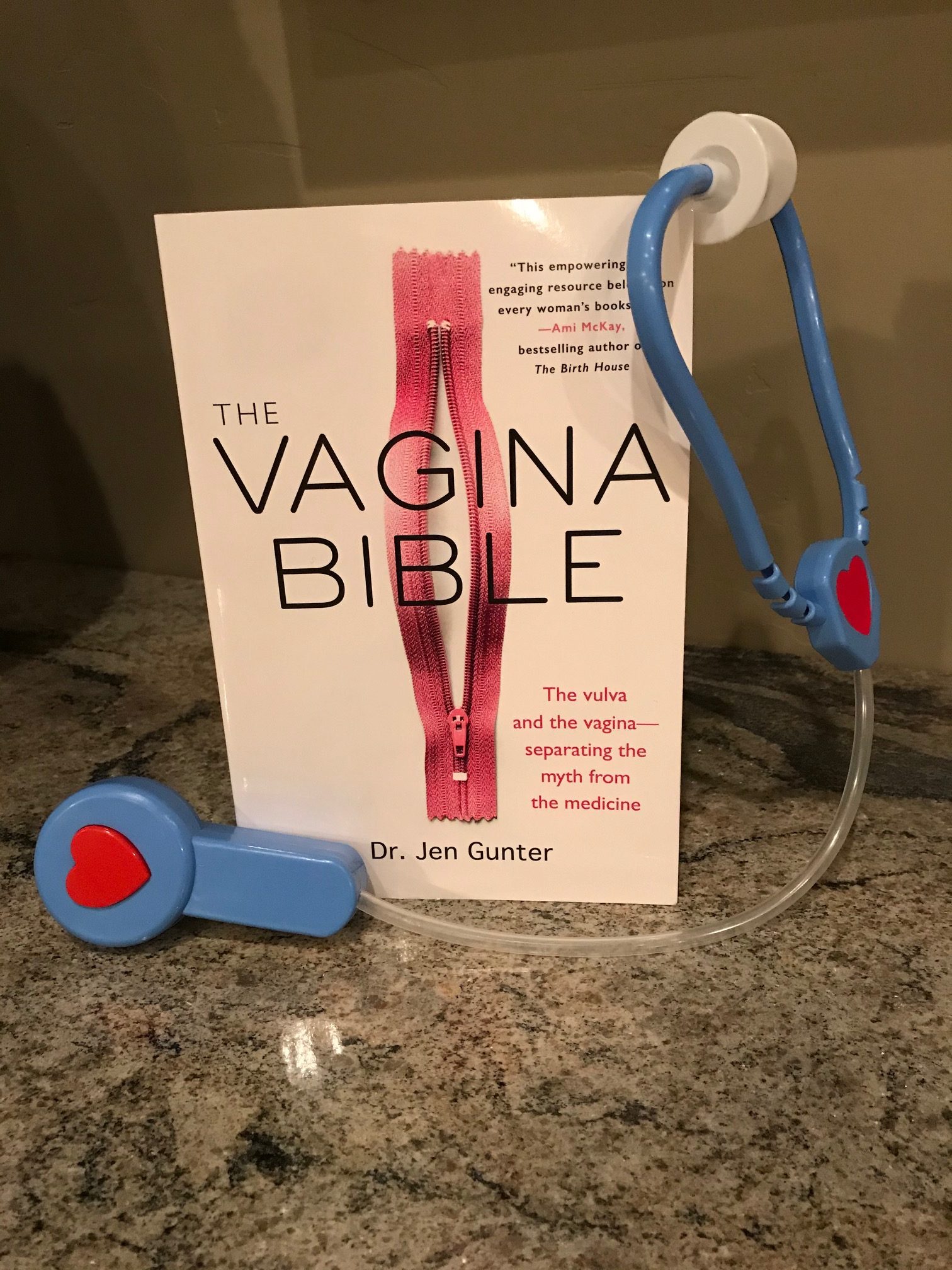Book Review: The Vagina Bible by Dr. Jen Gunter

So now that I’ve scared all male readers off with the title of this book, I can speak to the women directly. Some of you may be wondering why a book like this is necessary-haven’t all ‘vagina-related’ questions been answered by now? Surely by 2020 we can’t have much up for debate, but that depends who you talk to. The Vagina Bible by Dr. Jen Gunter is written by a female gynecologist for females. In the first sentence of the book she states “I have a vagenda: for every woman to be empowered with accurate information about the vagina and vulva” (p. XIX of the introduction). Not much to dispute with that sentence! The straightforward writing continues and builds from there; her intentions are very clear, and by the end of the book, I felt I had learned a significant amount of clear, unbiased information about my own body. What a concept!
The book is divided up into general sections, each applicable at different times in a woman’s life. Everyday practicalities and maintenance, skin care and cleansing, menstrual products and mythology, menopause, STIs, conditions, and symptoms are the general chapters, each including various sections that deal with specific concerns. One of the most valuable aspects to this book is the listing of of old wives tales and the medical truths behind them. Many woman can attest to this, but much of our knowledge and medical advice around our lady parts comes from our mothers or our close girlfriends-not always the best sources! Comforting, but not always accurate, so having a doctor speak ‘woman to woman’ to you is extremely useful. Probably the highest form of praise I could give this book is that I’m going to actually keep it! I usually give away my books as soon as I read them, but I’m going to store this on my shelf and give it to my daughter to read when she’s a teenager. I wish I had this book when I was a teen because it would have answered all my questions back then (many of them remaining until I read this book recently, quite frankly).
The underlying thesis or intention of the book is educating women and providing the unbiased information they deserve. Why is this necessary? Dr. Gunter rightly points out that for centuries, only men have been doctors, or held leadership positions in the companies that produce products for women, which has led to a glut of unnecessary or harmful products meant for women’s vaginas. Douching and related products are the perfect example of this; why do they even exist? Gunter urges us to RUN in the other direction if a medical professional ever recommends douching. Like cigarettes, there are many harmful products on the shelf that should never be used, and yet, they remain for sale. Genital wipes for women are another example of a product that is a waste of money, unless a woman suffers from incontinence or wears a diaper for bladder issues
these wipes are unnecessary and harmful to the regular bacteria of the vagina. She points out: “Why could women possibly need more anal cleaning than men after a bowel movement? That’s misogyny.” (p. 98). Strong words indeed, but as women we are inundated with products meant to evoke a ‘clean’ feeling around our genitals, while there is a noticeable absence of products meant for men in this same area. This is a clear example of misogyny, and one of the long-lasting effects of a patriarchal society, but luckily we have women like Dr. Jen Gunter to break through that old wall of misinformation.
I already know I’ll be recommending this manual to every woman I meet over the next few months, I truly think it’s one of those books that every female should have on their shelf simply as a reference. For example; hair removal is a popular topic these days because there are so many trends in what we should be doing to maintain our pubic hair growth, so luckily Gunter provides some clear pros and cons to each method-the dangers of some common treatments such as waxing will no doubt surprise many. She also gives extremely useful advice on how to talk to your doctor about any symptoms you have, and how you should search your symptoms on the internet, because she knows we all do it. Spoiler alert-don’t use google! The results are ranked by dollar amount and views, two things you don’t want to be influencing your medical diagnosis.

I read this book cover to cover, which wasn’t necessary because a bunch of sections aren’t applicable to me yet (like menopause, whew!) but I wanted to read it all to better inform my review. FYI, it’s meant to be read as a reference and manual. Another word of advice; it’s written from the perspective of doctor working within American healthcare, so there’s some advice on requesting cheaper tests in an attempt to save money. Here in Canada we are blessed with (mostly) free public healthcare so we don’t typically worry about those things, but still good to know nonetheless. Regardless of where you call home, this book should be on every woman’s bookshelf.







There are so many great books for girls and teens now, which puts out all the essential information that I didn’t get from my mom or grandma, and that was just the kind of fun bedtime reading we had at our house to fill any gaps in my vag-education LOL but it’s good to know this is on the bookstore and library shelves. I like the fact that you’ve said she calls out the misogyny that underpins various products and procedures – it’d be tiresome if she just mused on “hmmm, I wonder why they exist?” Superficial note, the cover makes me smile!
isn’t the cover great???
Well, you’ve convinced me to buy this so I can pass it on when I’m done. Can’t wait to find out all the things I didn’t know I didn’t know! :)
yes indeed, it’s one you’ll want to keep on your shelf for a long time :)
I love this❤️❤️. You’ve got a nice blog, and I’m glad to follow you. 🤗 It’s an honor to be here 🙇 . I hope I can make good friends with you💐